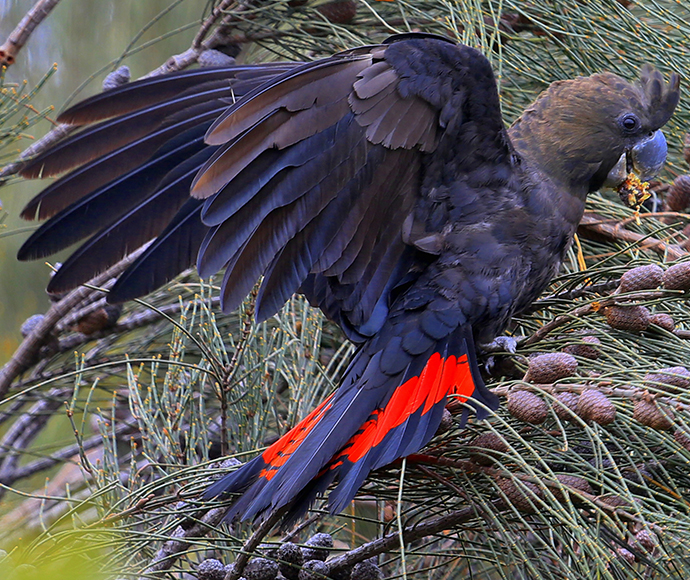The NSW Saving our Species program is calling for community volunteers to become "cockatoo counters" and help be part of the Great Inland Glossy Count this November.

National Parks and Wildlife Service Senior Project Officer Adam Fawcett said anyone can be a part of it.
"Bird lovers, citizen scientists or anyone with an interest in this beautiful threatened species, are needed to survey glossy black cockatoo populations at three key sites around inland NSW.
"Listed as vulnerable in NSW, glossies are easily spotted with their distinctive red markings and this cockatoo count will help our scientists understand more about this threatened bird," he said.
This is the second year the Great Inland Glossy Count has occurred. In 2019 seventy volunteers participated and counted over 700 glossy black cockatoos across inland NSW.
The count is part of a wider project to conserve the species at three key sites: the Pilliga Forests, Goonoo National Park and Goobang National Park and surrounding landscapes.
The dates for the 2020 surveys of what is fast becoming an annual cockatoo count are:
- 7 November – Pilliga Forests
- 14 November – Goonoo National Park
- 21 November – Goobang National Park and surrounds
"We are hoping to get 100 volunteers this year and what a great opportunity to get out to some of our amazing national parks and state forests, sit back and watch a threatened species in its natural habitat," Mr Fawcett said.
Volunteers will need to pre-register using the Department of Planning Industry and Environment's Volunteer Portal and will be required to follow COVID safety guidelines.
Family members are encouraged to register to volunteer together and will be stationed at one dam on their chosen weekend to count glossy black cockatoos as they come into known watering holes.
"We are asking volunteers to setup at their survey site an hour or so before dusk and wait as glossy black cockatoos fly in for water.
"The only requirements are the ability to make your way to a dam allocated by the Saving our Species team and to bring a pair of binoculars, a comfy chair and a notepad.
"Many of our seasoned participants make quite an event out of the evening, with cheers platters and other goodies a regular feature.
"It is a pretty amazing thing to see a threatened species in the wild and we love that we are able to give people this opportunity to get involved in threatened species conservation," Mr Fawcett said.
The project is funded by the NSW Government's Saving our Species program and the NSW Environmental Trust, and is led by Central West Local Land Services in partnership with NPWS, NSW Forest Corp, Dubbo Field Naturalists, Australian Wildlife Conservancy and the land owners and managers within these areas.






